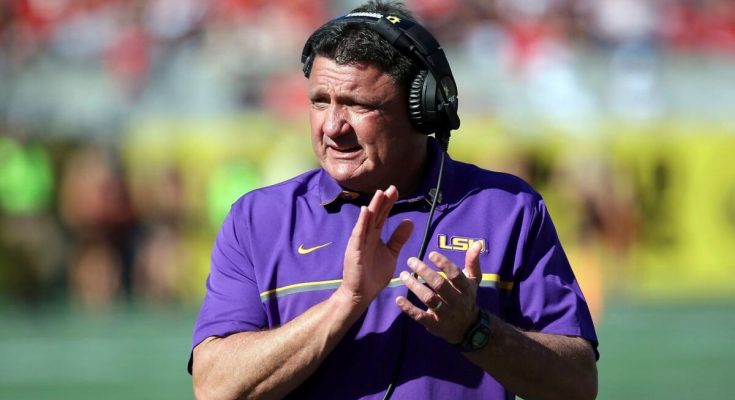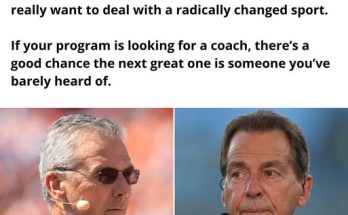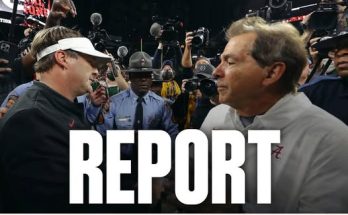There is a real stir unfolding in Baton Rouge, Louisiana. With the LSU Tigers football program entering a transitional phase following the dismissal of Brian Kelly, one familiar and, in many ways, beloved figure has stepped forward with a bold proposition: Ed Orgeron. The former head coach of LSU, the man who led the team to a national championship, has made clear that he would like to return to the helm — and seemingly is ready at a moment’s notice. The implications of such a development are many: cultural, practical, emotional and strategic for both coach and institution.
Orgeron’s words are straightforward and unmistakable. In an interview on ESPN’s “Unsportsmanlike,” when asked whether he would consider returning to LSU as head coach, he responded: “I’d love to. Are you kidding me? I’m one phone call away. I just gotta get in my truck; I could be there today.” He reiterated that his home remains in Baton Rouge, that he continues to have a deep affection for the program, and that the culture of Louisiana is something he still embraces. These aren’t words laid on for effect alone; they reflect a connection he has repeatedly emphasized between coach, players, state, and university. He critiqued his former successor’s relationship with the state of Louisiana, saying that the next coach must “embrace the state of Louisiana.”
To understand the significance of Orgeron’s interest, one must first revisit his prior tenure at LSU. He took over as head coach in 2016 and, over six seasons, compiled a record of 51–20. Most notably, he guided the Tigers through an undefeated 15–0 season in 2019, culminating in a national championship. That season was a high‐water mark for the program: under his watch, quarterback Joe Burrow became a Heisman winner, receivers such as Ja’Marr Chase and Justin Jefferson emerged as stars, and LSU became the toast of college football. However, the subsequent two seasons (2020 and 2021) did not live up to that peak: the program slipped, and ultimately Orgeron and LSU parted ways in what was described as a “mutual decision.”
Given his track record — both the highs of championship success and the lows of recent under‑performance — his presence in the coaching search is meaningful for LSU. The program now finds itself needing to replace Brian Kelly, who was dismissed after a disappointing 5–3 start (and 2–3 in the SEC) in 2025. The opening has drawn significant attention, and the school is being described as hosting one of the top vacancies in college football this season.
The fact that Orgeron is officially signaling readiness to return carries weight. On one hand, it brings a familiar face who knows the culture, the state, the expectations, and the program intimately. On the other hand, it raises questions: can he recapture what was so exceptional in 2019 in a vastly changed college football landscape? Does the appeal of nostalgia align with the practical needs of recruiting, NIL (name, image, likeness) economy, transfer portal dynamics, and the relentless arms race of major collegiate programs? The odds of success depend not only on coaching acumen but on structural fit, institutional support, and momentum.
In his remarks, Orgeron underscored the importance of cultural fit and buy‑in: “I think that’s one of the things – whether it’s true or not – the look from the outside, Brian Kelly never embraced the state of Louisiana. When you get those guys on your side, it’s very powerful.” He further stated that for the next coach, “one team, one heartbeat” would be the key. This emphasis on unity suggests that Orgeron believes the challenge is not just X’s and O’s, but reconnecting the program to its base: the fans, the state, the players, the identity of LSU. He also told interviewers that he’d only take a job (head coach or assistant) if he felt strongly that the institution wanted him as much as he wanted it.
From LSU’s perspective, there are pros and cons in seriously considering Orgeron’s return. On the positive side: the brand recognition is immediate; recruiting could benefit from his emotional ties and proven track record; the community could rally behind a familiar hero returning home. On the downside: the college football environment is vastly different now — the transfer portal, NIL deals, conference dynamics, and multimillion‑dollar expectations have shifted. Additionally, Orgeron’s last two seasons at LSU raised questions about sustainability following the apex of 2019.
Another aspect is expectation management. LSU’s fans and administration have little tolerance for mediocrity; the national championship set the bar extremely high. Orgeron himself acknowledged that the expectation at LSU is to win a national championship and that pressure escalates around the third year. For him, coming back means accepting not simply a job but a full‑scale mission: resetting, re‑energizing, and contending at the highest level. The risk is that if he returns and fails to deliver quickly, the narrative could shift to “returning to the past” rather than leading into the future.
Another important dimension is that of signal to other coaches and recruits. LSU will likely consider other high‑profile candidates — names such as Lane Kiffin at Ole Miss have reportedly come up. The decision to entertain Orgeron’s candidacy may reflect a choice: do you go with the known quantity — the man who delivered the 2019 title — or pursue a fresh voice with different pedigree? In making that decision, LSU must assess the direction of the program, its long‑term vision, and how well any candidate fits that vision.
For Orgeron personally, a return to LSU would be high‑stakes. At 64 years old, he has emphasized that he is “64 years young” and ready to coach again. He has said that he left “a little bit of meat on the bone” and is ready to get back in the game. This suggests that his motivation isn’t simply nostalgia — he sees an opportunity to do more, to perhaps build a legacy beyond the 2019 championship. Yet he must demonstrate that he can adapt to contemporary challenges: recruiting in the digital age, managing star players, navigating the SEC’s evolving competitiveness, and dealing with program culture and compliance.
At the same time, context matters. LSU’s current state as a program is in flux: Kelly’s dismissal signals that administrative patience is limited; fans expect wins; the SEC is as brutal as ever; and LSU’s rivals are hoarding talent, resources, and momentum. Reconnecting with the program’s past success could bolster morale, but it also highlights how far the program may have drifted. For Orgeron to succeed in a second tenure, he must not simply replicate 2019 but chart a viable path forward incorporating modern realities while preserving identity.
One benefit of Orgeron’s candidacy is his deep roots in Louisiana and the culture of the program. He has lived in the state, been part of the community, and thus is perceived by many as “one of us.” This connection can matter significantly in recruiting — not just for Louisiana prospects but for the deeper sense of being part of a movement. The quote about embracing the state of Louisiana reflects this. Whether that translates into actual recruiting advantage or internal cohesion remains to be seen, but the cultural value is tangible.
Still, some fans and analysts will ask: why not cast the net wide and bring in a new face, with fresh energy and ideas? The challenge with familiar faces is that the environment has changed, and previous success does not guarantee future success. The college football landscape is more fluid, transfers are more common, expectations more compressed. The question for Orgeron returning is: how will you handle this new environment? What adaptations will you make? How will you recruit differently? How will you keep up with the evolving SEC? These are questions he must answer convincingly to his potential employer and to the fan base.
There is also the financial and contractual component. LSU invested heavily in Kelly’s contract — reportedly a 10‑year deal worth nearly $100 million. The financial stakes for the next hire are large, and returning to a coach who was previously paid and then parted ways may raise questions about terms, expectations, and cost. Orgeron accepted a buyout when he left; returning means renegotiating terms and aligning incentives in a way that reflects both his past success and the university’s future goals.
The timing of his announcement is interesting. With LSU in the midst of the head coach search, Orgeron’s public openness to return places pressure on the university: are they going to pick the person who knows the program best, or pursue a high‑profile external hire? His comment, “I’m one phone call away,” suggests readiness but also implicitly puts LSU on notice: if you want me, act now. From the school’s vantage, that can be both a convenience (easy access to a known commodity) and a complication (higher expectations, fewer places to hide). The narrative could become “asking the same man who left to take the job again”, which may or may not resonate with all stakeholders.
A point of nuance: Orgeron also said he would be open to returning in a lesser role — perhaps as an assistant — if the fit was right. In one interview he said it “may be a head coach job. It may be a defensive line job with someone that I believe can win a championship.” That flexibility may help his candidacy, but it also signals that his focus is not strictly on returning as head coach at LSU — rather, on finding the right situation where he believes winning and cultural alignment are possible. That nuance can help temper the discussion: it’s not just about getting back, but getting back under the right terms.
For LSU fans, the idea of Orgeron’s return brings hope. It conjures up memories of the championship run and the dominant 2019 team. In a time of coaching uncertainties, he represents a known quantity and a symbol of past success. That emotional resonance should not be underestimated. But as previous chapters in LSU’s coaching history have shown, emotion alone is not enough; the program must move forward.
In sum, the candidacy of Ed Orgeron to return as head coach of LSU is compelling, layered, and consequential. It brings to the forefront questions of identity, culture, expectation and strategy. It forces LSU to decide: will it reaffirm its past by bringing back a coach with a championship pedigree and deep ties to the place, or will it move outward in search of the next new star? For Orgeron, it is a personal moment — an opportunity to revisit the program he loves and potentially lead it again — but one fraught with risk and reward. Should LSU choose him, they will be placing faith in a man who once delivered the highest of highs and must now prove he can operate successfully in a changed landscape. For now, the truck is ready — and with one phone call, Baton Rouge might once again see Coach O back in purple and gold.


